Marketing Education
Feb 18, 2024
By Ari Manor , CEO at ZOOZ

This is one in a series of articles that provide detailed and updated information about Marketing. In this specific article, which focuses on Marketing Education, you can read about:
- Marketing Education - Overview
- Which Marketing Degree is Best?
- Marketing Qualifications
- Marketing Knowledge and Skills
- What Marketing Certifications Should I Get?
- Marketing Internships Near Me
- What Do Marketing Majors Do
- Marketing Associations
- Marketing Like a Pro
- Marketing for Dummies
- Marketing Literature
- Marketing Books
- Marketing Trade Magazines
- Marketing Training
- Marketing Workshops
- Marketing Events
- Marketing Events Near Me
For additional articles about Marketing, see the Topic Menu.

Marketing Education - Overview
Marketing education encompasses a broad spectrum of knowledge, skills, and competencies designed to prepare individuals for careers in marketing, spanning from traditional strategies to digital and social media marketing. It aims to equip students with both the theoretical foundations and practical applications of marketing principles in various business contexts. Here’s an overview:
Fundamental Areas of Study
- Principles of Marketing: Introduction to basic marketing concepts, including market segmentation, targeting, positioning, and the marketing mix (Product, Price, Place, Promotion).
- Consumer Behavior: Understanding how consumers make purchasing decisions and the psychological, social, and cultural factors that influence those decisions.
- Market Research: Techniques for gathering, analyzing, and interpreting data about the market, competition, and customer preferences to inform marketing strategies.
- Digital Marketing: Strategies for engaging with customers through digital channels, including content marketing, social media, SEO/SEM, and email marketing.
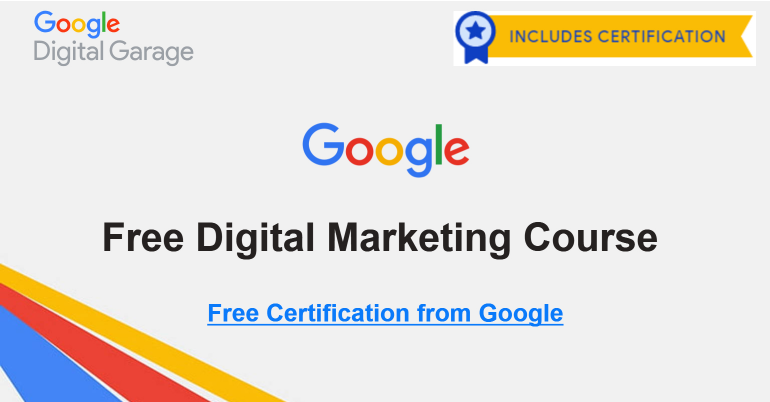 Case Study: Google’s Digital Marketing Course
Case Study: Google’s Digital Marketing Course- Organization: Google, Global
- Program Overview: Google offers a Digital Marketing Course through its online learning platform, Google Digital Garage. The course is designed to help individuals develop digital marketing skills, including analytics, social media marketing, and search engine optimization (SEO), at no cost.
- Results/Impact: Thousands of participants have completed Google’s Digital Marketing Course, many of whom have successfully transitioned into digital marketing roles or enhanced their existing careers. Testimonials highlight the course’s role in helping individuals start their marketing agencies, secure marketing positions, or grow their businesses online.
- Brand Management: Developing and maintaining a brand’s image, values, and customer promise.
- Sales Management: Strategies and processes for effectively selling products and services, including sales force management.
- Advertising and Promotion: Techniques for creating compelling advertising campaigns and promotions to communicate with and persuade potential customers.
Educational Pathways
- Undergraduate Degrees: Bachelor’s degrees in marketing, business administration with a major in marketing, or related fields.
- Graduate Degrees: Master’s degrees such as an MBA with a specialization in Marketing or a Master of Science in Marketing for advanced knowledge and leadership roles.
- Certifications and Online Courses: Certifications from recognized institutions or platforms (e.g., Google Analytics Certification, HubSpot Academy) and specialized online courses in digital marketing, social media, etc.
Skills and Competencies
- Analytical Skills: Ability to interpret market data and analytics to make informed marketing decisions.
- Creativity: Coming up with innovative ideas for campaigns, content, and marketing strategies.
- Communication Skills: Effective written and verbal communication, crucial for content creation, presentations, and client relations.
- Technical Skills: Proficiency in marketing technologies, digital tools, and platforms.
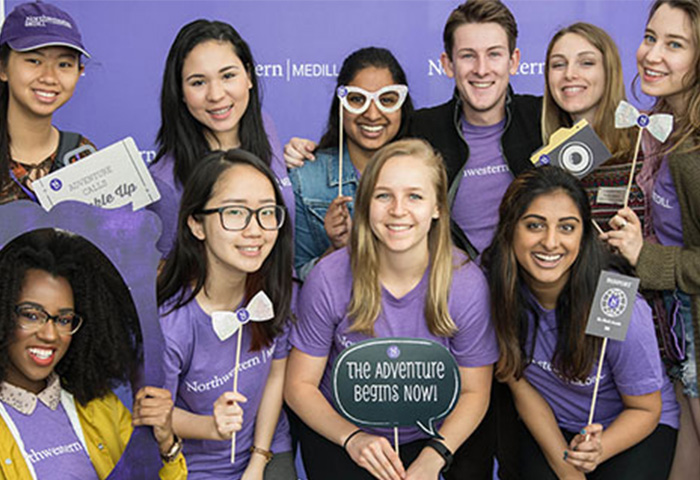 Case Study: Northwestern University’s Integrated Marketing Communications Program
Case Study: Northwestern University’s Integrated Marketing Communications Program
- Institution: Northwestern University, Medill School, United States
- Program Overview: Northwestern University’s Medill School offers a Master's degree in Integrated Marketing Communications (IMC). The program emphasizes a comprehensive approach to marketing, combining traditional tactics with digital strategies to prepare students for leadership roles in marketing.
- Results/Impact: Graduates of the IMC program have gone on to hold significant positions in leading companies and agencies worldwide, attributing their success to the diverse skill set and strategic insights gained from the program. Notably, alumni have taken roles at Google, PepsiCo, and Ogilvy, among others, showcasing the program’s effectiveness in preparing students for the dynamic marketing industry.
The Evolving Landscape
Marketing education is continually evolving, reflecting the fast-paced changes in technology, consumer behavior, and marketing platforms. It emphasizes not only foundational marketing theories but also the application of cutting-edge digital tools and strategies, preparing students for the dynamic nature of marketing careers in the digital age.
In conclusion, marketing education offers a comprehensive framework for understanding the complexities of the marketing field, blending traditional marketing principles with the latest digital trends and technologies. It prepares individuals for a successful career in marketing by developing essential skills, knowledge, and practical experience.

Which Marketing Degree is Best?
Determining the "best" marketing degree depends on your career goals, interests, and the specific aspects of marketing you are most passionate about. Marketing encompasses a wide range of disciplines, from digital marketing and analytics to brand management and advertising.
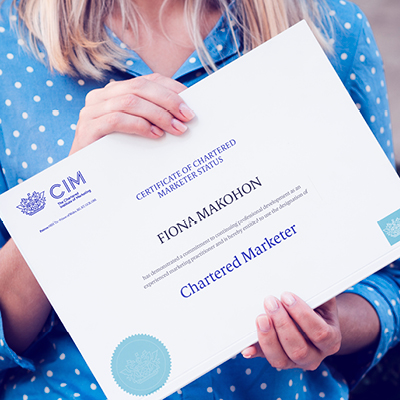 Case Study:
Case Study:
The Chartered Institute of Marketing (CIM) Qualification
- Organization: The Chartered Institute of Marketing (CIM), United Kingdom
- Program Overview: CIM offers various qualifications, from introductory certificates to advanced diplomas in professional marketing. These qualifications are recognized internationally and focus on contemporary marketing techniques, strategic planning, and execution.
- Results/Impact: Professionals holding CIM qualifications report significant career advancements, including promotions, increased responsibilities, and opportunities to lead marketing initiatives. The recognition of CIM credentials across global markets underscores their value in providing marketers with a competitive edge and a comprehensive understanding of modern marketing practices.
Here's a look at various marketing degrees and how they align with different career paths:
Bachelor’s Degrees
- Bachelor of Science (B.S.) in Marketing: Focuses on the scientific and quantitative aspects of marketing, ideal for students interested in market research, data analysis, and marketing metrics.
- Bachelor of Arts (B.A.) in Marketing: Offers a broader liberal arts education, incorporating the creative and theoretical aspects of marketing, suitable for students interested in advertising, content creation, and brand strategy.
- Bachelor of Business Administration (BBA) with a concentration in Marketing: Provides a comprehensive business education with a focus on marketing principles, best for those interested in a holistic business approach to marketing strategies and management.
Master’s Degrees
- Master of Business Administration (MBA) with a Marketing Concentration: Designed for individuals seeking leadership roles, this degree combines general business management skills with specialized marketing knowledge, preparing graduates for strategic decision-making roles.
 Case Study: University of Pennsylvania’s Wharton School Marketing MBA
Case Study: University of Pennsylvania’s Wharton School Marketing MBA- Institution: University of Pennsylvania, Wharton School, United States
- What Was Done: The Wharton School offers a Marketing MBA that is highly regarded for its rigorous curriculum, emphasis on data-driven decision making, and integration of theory with practical application. The program is designed to prepare students for high-level marketing roles across industries.
- Results/Impact: Wharton’s Marketing MBA graduates have secured positions at top firms such as Amazon, McKinsey & Company, and Coca-Cola. The program’s strong focus on quantitative analysis, consumer behavior, and strategic marketing has been credited with equipping graduates with the skills needed to excel in complex marketing environments.
- Master of Science (M.S.) in Marketing: Offers an in-depth focus on marketing techniques, consumer behavior, and analytics. It’s ideal for those looking to specialize in a specific area of marketing or pursue advanced research roles.
- Master of Arts (M.A.) in Marketing: Similar to the M.S., but with a greater focus on the cultural, sociological, and theoretical aspects of marketing.
Specialized Degrees and Certifications
- Digital Marketing Degrees: Specialized programs focusing exclusively on digital marketing strategies, SEO, social media marketing, and e-commerce. These are increasingly popular given the growth of digital marketing.
- Professional Certifications: Certifications from recognized organizations or platforms (e.g., Google Analytics Certification, HubSpot Content Marketing Certification) can complement a marketing degree by providing targeted knowledge and skills in specific tools and platforms.
Considerations for Choosing the Best Degree
- Career Goals: Align your degree choice with your career aspirations. For strategic roles, an MBA might be best. For analytical roles, consider a B.S. or M.S. in Marketing.
- Industry Needs: Research the demands of the industry you’re interested in. Digital marketing skills are highly sought after across industries.
- Learning Style: Consider whether you prefer a more theoretical approach or a hands-on, practical learning experience.
- Flexibility and Specialization: Some degrees offer more flexibility in coursework or the opportunity to specialize in areas like digital marketing, brand management, or analytics.
- Networking: Look for programs that have strong alumni networks, industry partnerships, and active student organizations.
Ultimately, the "best" marketing degree is one that aligns with your personal and professional goals, equips you with the skills demanded by your chosen career path, and offers the knowledge, connections and competencies valued in the evolving marketing landscape. It's also beneficial to complement formal education with continuous learning and professional development opportunities in the field.
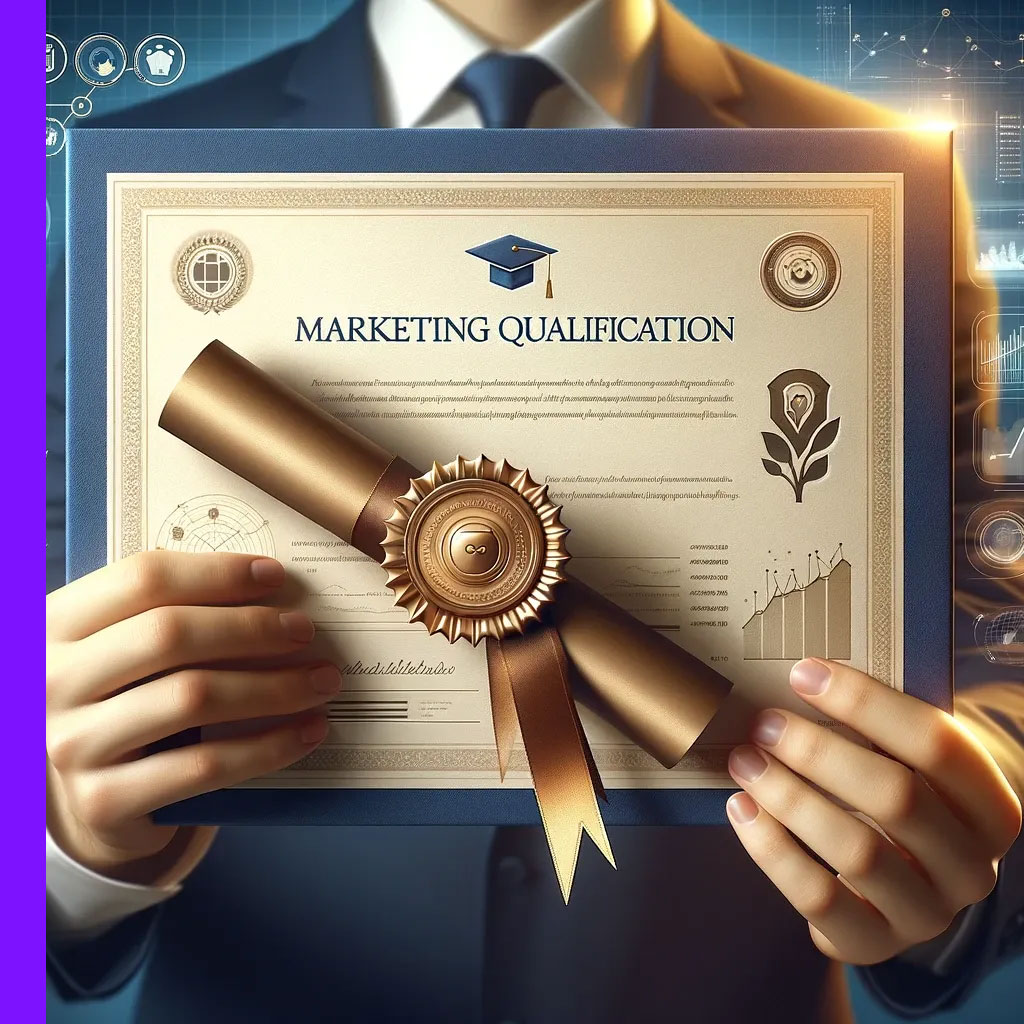
Marketing Qualifications
Marketing qualifications encompass a range of educational achievements, professional certifications, and practical skills that prepare individuals for a career in the diverse field of marketing. These qualifications not only provide foundational knowledge in marketing principles but also offer specialized expertise in various areas such as digital marketing, analytics, content creation, and strategy development.
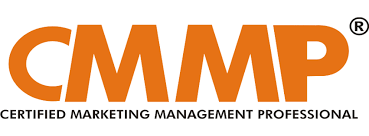 Case Study:
Case Study:
Career Transition to Marketing Director at Salesforce
- Professional: Michael Thompson
- Role: Marketing Director
- Organization: Salesforce, United States
- What Was Done: Michael transitioned from a sales role to marketing by obtaining a Certified Marketing Management Professional (CMMP) designation. His goal was to broaden his skill set and gain a strategic understanding of marketing's role in business growth.
- Results/Impact: With his new qualifications, Michael played a crucial role in integrating sales and marketing efforts at Salesforce, leading to improved lead generation and customer engagement strategies. His career progression underscores the impact of marketing qualifications on professional development and business success.
Here's an overview of key marketing qualifications:
Educational Achievements
- Bachelor’s Degrees: A Bachelor of Science (B.S.) in Marketing, Bachelor of Arts (B.A.) in Marketing, or a Bachelor of Business Administration (BBA) with a concentration in Marketing provides a comprehensive foundation in marketing principles, consumer behavior, and strategic planning.
- Master’s Degrees: Advanced degrees like a Master of Business Administration (MBA) with a marketing specialization, Master of Science (M.S.) in Marketing, or a Master of Arts (M.A.) in Marketing offer deeper insights into marketing strategies, research methodologies, and digital marketing trends.
Professional Certifications
- Content Marketing Certification: Offered by organizations such as the Content Marketing Institute, these certifications focus on content strategy, creation, and distribution.
- Social Media Marketing Certification: Platforms like Facebook, Blueprint and Hootsuite Academy provide certifications that demonstrate expertise in social media strategies and advertising.
- Digital Marketing Certifications: Certifications from platforms like Google Analytics Academy, HubSpot Academy, and the Digital Marketing Institute (DMI) validate skills in SEO, content marketing, social media, and email marketing.
 Case Study: Enhancing Career Paths at L'Oréal with Marketing Qualifications
Case Study: Enhancing Career Paths at L'Oréal with Marketing Qualifications
- Professional: Jane Martin
- Role: Brand Manager
- Organization: L'Oréal, France
- What Was Done: Jane pursued additional marketing qualifications, including a professional certification from the Digital Marketing Institute (DMI). This decision was part of her strategy to deepen her expertise in digital marketing and analytics.
- Results/Impact: The additional qualifications enabled Jane to successfully lead digital transformation initiatives within L'Oréal, significantly impacting the brand's online presence and sales. Her career advancement at L'Oréal, culminating in a leadership role, highlights the value of continuous learning and certification in marketing.
Specialized Qualifications
- SEO/SEM Expertise: Specialized training or certifications in search engine optimization (SEO) and search engine marketing (SEM) are highly valued due to the importance of online visibility and traffic.
- Data Analytics and Insights: Qualifications in marketing analytics, data visualization, and customer insights analysis are crucial for roles that require data-driven decision-making.
- Brand Management: Courses and certifications that focus on brand development, positioning, and management prepare individuals for roles in brand strategy and identity.
Practical Skills
- Communication Skills: Strong verbal and written communication skills are essential for creating compelling marketing materials, presenting strategies, and collaborating with teams.
- Creative Thinking: The ability to generate innovative ideas for campaigns, content, and marketing solutions is highly valued.
- Technical Skills: Proficiency in marketing tools and software (e.g., CRM systems, Adobe Creative Suite, marketing automation platforms) is necessary for executing digital marketing strategies.
- Analytical Thinking: The ability to interpret data, identify trends, and make informed marketing decisions is critical for measuring the effectiveness of marketing efforts.
Continuous Learning
The marketing field is dynamic, with new technologies, platforms, and consumer behaviors emerging regularly. Continuous learning through workshops, webinars, online courses, and professional development programs is essential to keep up with industry trends and maintain a competitive edge.
In summary, marketing qualifications range from formal education to professional certifications and practical skills, each contributing to the preparation of individuals for successful careers in marketing. Emphasizing both the creative and analytical aspects of marketing, these qualifications enable marketers to effectively engage audiences, drive brand growth, and achieve business objectives.

Marketing Knowledge and Skills
Marketing knowledge and skills are crucial assets for professionals aiming to succeed in the dynamic and competitive field of marketing. This expertise not only involves understanding fundamental marketing concepts but also requires the ability to apply practical tools and strategies in real-world scenarios.
Here's an overview of essential marketing knowledge and skills that are critical for navigating today's marketing landscape:
Fundamental Marketing Knowledge
- Marketing Principles: Understanding of core concepts such as the 4 Ps (Product, Price, Place, Promotion), market segmentation, targeting, positioning, and the marketing mix.
- Consumer Behavior: Insights into how consumers make decisions, including psychological, cultural, and social factors influencing their behavior.
- Market Research: Skills in designing and conducting research to gather market insights, analyze consumer data, and inform marketing strategies.
Digital Marketing Skills
- Digital Strategy: Ability to develop comprehensive digital marketing strategies that leverage online channels to achieve business goals.
- Content Marketing: Skills in creating and distributing valuable, relevant, and consistent content to attract and retain a clearly defined audience.
- SEO and SEM: Understanding of search engine optimization and search engine marketing to enhance online visibility and drive targeted traffic.
- Social Media Marketing: Proficiency in using social media platforms to engage with customers, build brand awareness, and drive sales.
 Case Study: IBM’s Marketing Skills Transformation Initiative
Case Study: IBM’s Marketing Skills Transformation Initiative
- Company: IBM, Global
- What Was Done: IBM launched a company-wide initiative to upskill its marketing team, focusing on data analytics, artificial intelligence, and digital marketing. The program included workshops, online courses, and project-based learning to ensure marketers had the latest skills to navigate the digital landscape.
- Results/Impact: This strategic focus on marketing skills development helped IBM enhance its global marketing campaigns, improve customer insights, and drive innovation in product marketing. The initiative not only increased the effectiveness of IBM’s marketing efforts but also highlighted the critical role of continuous skill development in staying competitive.
Analytical Skills
- Data Analysis: Ability to analyze data sets to extract actionable insights, measure campaign effectiveness, and make data-driven decisions.
- Performance Metrics: Knowledge of key performance indicators (KPIs) and metrics to assess the success of marketing activities.
Soft Skills
- Communication: Excellent verbal and written communication skills for crafting compelling marketing messages, presenting ideas, and collaborating with teams.
- Creativity: Creative thinking to develop innovative marketing campaigns that stand out in a crowded market.
- Problem-Solving: Ability to identify challenges and creatively find solutions or alternatives.
Emerging Trends
- Technology Proficiency: Keeping up with the latest marketing technologies, including automation and AI tools, CRM systems, and analytics platforms.
- Adaptability: Being flexible and able to pivot strategies in response to market changes or new insights.
 Case Study: Adobe’s Creative Residency Program
Case Study: Adobe’s Creative Residency Program
- Company: Adobe, Global
- What Was Done: Adobe’s Creative Residency program supports emerging artists and designers by providing them with the tools, resources, and mentorship to build their marketing and creative skills. The program focuses on nurturing creative talent with the skills needed to succeed in the digital marketing space, including branding, storytelling, and content creation.
- Results/Impact: Graduates of the Creative Residency program have gone on to launch successful careers as freelance designers, content creators, and marketing consultants, contributing innovative ideas and projects to the creative community. Adobe’s investment in creative skills development underscores the importance of combining marketing knowledge with creative skills in the digital age.
Marketing professionals must cultivate a blend of these knowledge areas and skills to effectively reach and engage audiences in today's fast-paced digital environment. Continuous learning and professional development are key, as the field of marketing is constantly evolving with new technologies, platforms, and consumer behaviors.

What Marketing Certifications Should I Get?
Choosing the right marketing certification depends on your career goals, the specific marketing skills you want to develop, and the industry you're targeting. Marketing certifications can strengthen your resume, provide you with the latest industry knowledge, and demonstrate your commitment to professional growth.
Here’s a list of widely recognized marketing certifications that can benefit professionals at various stages of their careers:
Digital Marketing
- HubSpot Content Marketing Certification: Offers insights into content creation, strategy, and marketing to attract and engage customers effectively.
- Facebook Blueprint Certification: Recognized expertise in advertising on Facebook and its family of apps, including Instagram, Messenger, and WhatsApp.
- Google Ads Certification: Validates your expertise in online advertising, including search, display, and mobile advertising with Google Ads.
- Google Analytics Individual Qualification: Demonstrates proficiency in Google Analytics, crucial for roles involving website analytics and performance measurement.
 Case Study: Google Analytics Individual Qualification (IQ) Success Story
Case Study: Google Analytics Individual Qualification (IQ) Success Story- Professional: Alex Johnson
- Role: Digital Marketing Analyst
- Organization: E-commerce Platform, United Kingdom
- What Was Done: To improve his analytical skills and understanding of web analytics, Alex pursued and obtained the Google Analytics Individual Qualification (IQ). This certification helped him master the use of Google Analytics, from basic principles to advanced data analysis and reporting.
- Results/Impact: Alex's expertise in Google Analytics led to a 30% improvement in his company's online marketing ROI by optimizing their digital advertising campaigns and website user experience. His progression highlights the practical benefits of specialized marketing certifications in enhancing job performance and career advancement.
SEO & SEM
- SEMrush SEO Toolkit Certification: Validates skills in using SEMrush tools for SEO and competitive research.
- Moz SEO Essentials Certification: Focuses on SEO fundamentals, keyword research, page optimization, and link building using Moz tools.
Email Marketing
- HubSpot Email Marketing Certification: Covers email marketing strategies, including segmentation, email design, analytics, and optimization.
- Email Marketing Specialist Certification by DigitalMarketer: Teaches email marketing tactics to increase engagement and conversions.
Content & Social Media Marketing
- Content Marketing Institute Certification: Recognized for expertise in developing and executing content marketing strategies.
- Hootsuite Social Marketing Certification: Validates skills in social media marketing, including strategy development, content creation, and analytics.
Strategy & Analysis
- Digital Marketing Certified Associate (DMCA) by Simplilearn: A comprehensive certification covering digital marketing disciplines from SEO to social media and email marketing.
- American Marketing Association (AMA) Professional Certified Marketer (PCM): Offers certifications in digital marketing and content marketing, recognized across industries for marketing knowledge and expertise.
Inbound Marketing
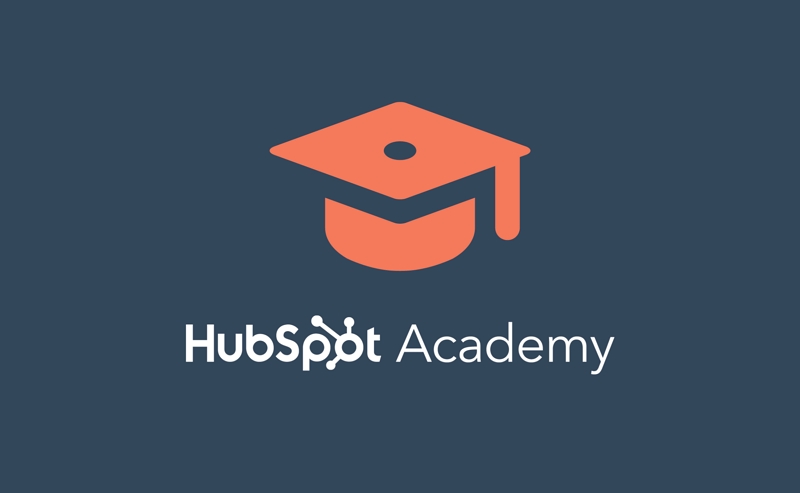 Case Study:
Case Study:
HubSpot Academy's Inbound Certification Impact
- Professional: Sarah Lin
- Role: Inbound Marketing Specialist
- Organization: Tech Startup, United States
- What Was Done: Sarah obtained the HubSpot Inbound Marketing Certification to enhance her skills in attracting and engaging customers through content marketing, social media, and SEO. The certification provided her with a comprehensive understanding of how to leverage inbound marketing techniques effectively.
- Results/Impact: Armed with her new certification, Sarah implemented a successful inbound marketing strategy that doubled her company’s website traffic and increased lead generation by 150% within six months. Her story illustrates the value of reputable marketing certifications in advancing both individual careers and organizational goals.
Choosing the Right Certifications
- Align with Career Goals: Select certifications that align with your career aspirations. If you're aiming for a role in SEO, focus on SEO certifications; if content marketing is your goal, look for relevant content marketing certifications.
- Industry Relevance: Consider certifications that are recognized and valued in your target industry or by your current or prospective employers.
- Skill Level: Choose certifications that match your skill level. Some certifications are designed for beginners, while others are for advanced practitioners.
Investing time and resources in marketing certifications can significantly enhance your knowledge, skills, and employability. As the marketing landscape continues to evolve, staying updated with the latest trends, tools, and best practices through these certifications will be invaluable for any marketing professional.

Marketing Internships Near Me
Securing a marketing internship is a pivotal step for students and aspiring marketing professionals looking to gain real-world experience in the field. These opportunities not only offer invaluable insights into the dynamics of marketing operations but also provide hands-on experience with projects that can shape your understanding of various marketing strategies and tools. Whether you're aiming to specialize in digital marketing, content creation, analytics, or any other marketing niche, finding the right internship near you can significantly enhance your skills and boost your resume.
Here is an overview on how to find marketing internships and what to consider during your search:
How to Find Marketing Internships
- University Career Services: If you're a student or recent graduate, your university's career services office is a great place to start. They often have listings of available internships and can provide resources for applying.
- Online Job Boards: Websites like Indeed, Glassdoor, LinkedIn, and Internships.com regularly list marketing internship opportunities. You can filter searches by location to find internships near you.
- Company Websites: Identify companies you're interested in and check their careers pages for internship listings. Many companies post internship opportunities directly on their websites.
- Networking: Utilize your professional and personal networks. Attend industry events, workshops, and webinars. Sometimes, internships come through personal connections or networking events.
- Social Media: Follow companies and industry leaders on social media platforms. They often post about available internship opportunities or can direct you to where listings are posted.
Considerations When Searching for Internships
- Relevance: Look for internships that align with your career interests within marketing, such as digital marketing, content creation, or market research.
- Company Size: Consider internships in both large corporations and small startups. Each offers different learning opportunities and experiences.
- Location: While searching for internships "near me" is common, also consider remote internships, which can provide flexibility and access to companies not limited by geographic location.
 Case Study: Remote Marketing Internship Success through LinkedIn Networking
Case Study: Remote Marketing Internship Success through LinkedIn Networking- Professional: Miguel Santos
- Role: Digital Marketing Intern
- Organization: Buffer, Remote (Fall 2020)
- What Was Done: Miguel found a remote marketing internship opportunity at Buffer through LinkedIn. By actively engaging with Buffer's content and utilizing LinkedIn to network with current Buffer employees, he gained insight into the company culture and the internship role. His proactive approach led to a referral and ultimately an internship offer.
- Results/Impact: During his remote internship, Miguel worked on various digital marketing projects, including social media management and content creation, which significantly improved Buffer’s engagement rates. The hands-on experience and the mentorship he received were instrumental in developing his marketing skills. Miguel’s success story underscores the effectiveness of leveraging social media and networking for finding remote internship opportunities in marketing.
- Duration and Commitment: Pay attention to the internship's duration and the expected time commitment. Some might be part-time during the academic year, while others could be full-time over the summer.
- Paid vs. Unpaid: Ideally, look for paid internships, but some fields or highly competitive companies might only offer unpaid positions. Evaluate what's most important for your career development and financial needs.
 Case Study:
Case Study:
Navigating to a Google Marketing Internship- Professional: Clara Johnson
- Role: B2B Marketing Intern
- Organization: Google, United States (Summer 2019)
- What Was Done: Clara utilized her university's career services to discover and apply for a marketing internship at Google. The career services office provided her with resume advice, interview preparation, and the opportunity to attend a Google campus recruitment event hosted at her university.
- Results/Impact: Clara's internship at Google involved working on B2B marketing strategies for Google Cloud products. The experience offered her a deep dive into digital marketing within the tech industry, enhancing her skills in analytics, content marketing, and digital campaigns. Post-internship, Clara received a full-time job offer from Google, highlighting the internship's role as a critical stepping stone in her marketing career.
Remember, internships are not just about gaining work experience; they're also about learning from professionals in the field, understanding workplace dynamics, and building a network that can support your future career growth.

What Do Marketing Majors Do
Marketing majors study a broad range of topics related to the promotion and selling of products and services. Their education equips them with a comprehensive understanding of consumer behavior, market research, digital marketing, branding, and strategic planning, among other key areas.
Here’s a closer look at what marketing majors do during their studies and the skills they acquire:
Core Areas of Study
- Marketing Principles: Introduction to the fundamental concepts of marketing, including the marketing mix (Product, Price, Place, Promotion), segmentation, targeting, and positioning.
- Consumer Behavior: Examination of how and why consumers make purchasing decisions, incorporating insights from psychology, sociology, and economics.
- Market Research: Training in research methods and analytics to understand market trends, consumer preferences, and competitive dynamics.
 Case Study: Procter & Gamble's Market Research Drives Product Innovation
Case Study: Procter & Gamble's Market Research Drives Product Innovation- Company: Procter & Gamble (P&G), Global
- What Was Done: P&G's dedication to comprehensive market research, a fundamental skill for marketing majors, led to the development of the Swiffer WetJet. Through understanding consumer frustrations with traditional mops, P&G identified an opportunity for a new, easy-to-use cleaning product.
- Results/Impact: The launch of the Swiffer WetJet revolutionized the cleaning market, significantly boosting P&G’s sales in the home care segment. This success story exemplifies how marketing majors apply market research and consumer behavior analysis to drive product innovation and business growth.
- Digital Marketing: Overview of online marketing strategies, including content marketing, social media, SEO/SEM, and email marketing.
- Brand Management: Strategies for building, managing, and evaluating brand equity and identity.
 Case Study: Dove's "Real Beauty" Campaign Transforms Branding Strategy
Case Study: Dove's "Real Beauty" Campaign Transforms Branding Strategy- Company: Dove, Unilever, Global
- What Was Done: Leveraging insights into consumer behavior, particularly women's perceptions of beauty, Dove launched the "Real Beauty" campaign. This strategic marketing move, rooted in understanding consumer psychology, aimed to challenge beauty stereotypes and position Dove as a brand that celebrates real, diverse forms of beauty.
- Results/Impact: Dove's "Real Beauty" campaign led to a significant increase in brand loyalty and sales, while also sparking a global conversation about beauty standards. The campaign's success demonstrates the impact of strategic branding and consumer behavior knowledge—key areas of focus for marketing education—on achieving business objectives and societal impact.
- Sales Strategies: Techniques for effective selling, understanding the sales process, and customer relationship management.
- Advertising and Promotion: Study of advertising methods, campaign development, and the use of various promotional tools.
Skills Acquired
- Analytical Skills: Ability to analyze market data and consumer insights to inform marketing strategies.
- Communication Skills: Proficiency in crafting and delivering clear, persuasive marketing messages across various media.
- Creative Thinking: Developing innovative marketing strategies and campaigns that stand out in a crowded marketplace.
- Strategic Planning: Ability to create comprehensive marketing plans that align with business objectives and effectively utilize resources.
- Digital Literacy: Familiarity with digital marketing tools and platforms, including analytics software, content management systems, and social media.
Practical Experience
- Internships: Many marketing majors complete internships with companies or marketing agencies to gain practical experience and professional networking opportunities.
- Capstone Projects: Students often undertake capstone projects that require them to develop and present comprehensive marketing strategies for real or hypothetical businesses.
- Case Studies: Analysis of real-world marketing challenges and solutions, helping students apply theoretical knowledge to practical scenarios.
Career Paths
Graduates with a marketing degree can pursue a wide range of careers, including:
- Marketing Coordinator/Manager: Overseeing marketing campaigns and initiatives.
- Digital Marketer: Specializing in online marketing strategies to engage customers.
- Brand Manager: Managing a brand’s image, development, and market strategy.
- Market Research Analyst: Analyzing data to understand market trends and consumer behavior.
- Content Creator/Strategist: Developing engaging content across various platforms.
Marketing majors are well-equipped to adapt to the dynamic marketing landscape, leveraging their skills and knowledge to drive business growth, engage customers, and build strong brands. The blend of theoretical knowledge and practical skills acquired through their studies prepares them for successful careers in the diverse field of marketing.

Marketing Associations
Marketing associations are professional organizations that serve individuals in the marketing field by providing resources, networking opportunities, professional development, and industry insights. These associations aim to support marketers in their careers, advocate for the marketing profession, and foster a community of practice among professionals.
Here are some prominent marketing associations in the USA:
American Marketing Association (AMA)
- Focus: Offers a wide range of resources, including publications, conferences, training, and networking events for marketing professionals across various specialties.
 Case Study: American Marketing Association (AMA) Elevates Marketing Standards
Case Study: American Marketing Association (AMA) Elevates Marketing Standards- Company: American Marketing Association (AMA), United States
- What Was Done: The AMA has been instrumental in setting ethical standards, best practices, and professional development resources for the marketing community. Through publications, conferences, and training programs, the AMA provides ongoing education and networking opportunities for marketing professionals.
- Results/Impact: AMA’s efforts have contributed to the advancement of marketing as a profession, ensuring that marketers across the globe have access to the resources they need to stay current with industry trends and maintain high ethical standards in their work.
Data & Marketing Association (DMA)
- Focus: Concentrates on data-driven marketing, offering resources on analytics, data management, and compliance. It provides research, webinars, and certifications.
Interactive Advertising Bureau (IAB)
- Focus: Dedicated to the growth of the digital advertising marketplace. It offers thought leadership, industry standards, research, and legal support for online advertisers and marketers.
Society for Marketing Professional Services (SMPS)
- Focus: Targets marketing and business development professionals in the architectural, engineering, and construction industries, offering education, certification, and networking events.
Content Marketing Institute (CMI)
- Focus: Specializes in content marketing education and training, offering resources such as conferences, webinars, and a certification program.
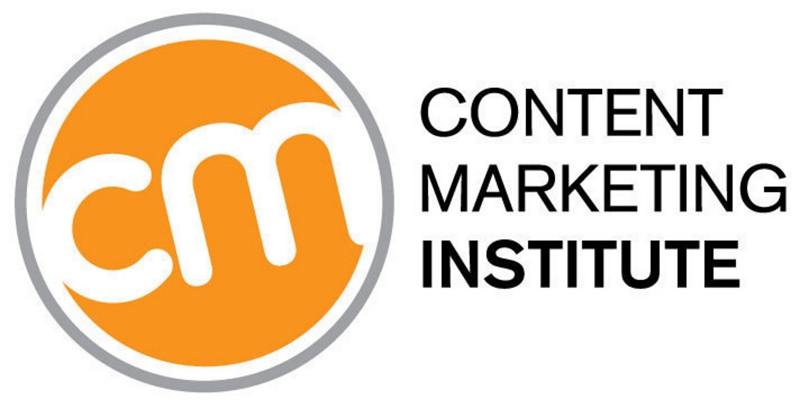 Case Study: Content Marketing Institute (CMI) Champions Content as Key Marketing Strategy
Case Study: Content Marketing Institute (CMI) Champions Content as Key Marketing Strategy- Company: Content Marketing Institute (CMI), United States
- What Was Done: The CMI has played a pivotal role in advocating for content marketing as a fundamental strategy. Through its annual Content Marketing World conference, extensive research, and educational resources, CMI has highlighted the effectiveness of content marketing in building audience trust and driving business growth.
- Results/Impact: CMI’s initiatives have led to broader adoption of content marketing strategies across industries, with companies leveraging educational and engaging content to achieve their marketing objectives. CMI’s work demonstrates the power of industry associations in promoting innovative marketing strategies and supporting professionals in their implementation.
Digital Marketing Institute (DMI)
- Focus: Although focused on public relations, PRSA is relevant for marketers involved in integrated marketing communications, offering professional development and accreditation in PR.
Search Engine Marketing Professional Organization (SEMPO)
- Focus: Focuses on search engine marketing and search engine optimization, providing resources, research, and certification programs for professionals.
Social Media Club (SMC)
- Focus: Brings together social media professionals and enthusiasts to share best practices, establish standards, and promote social media literacy.
E-Marketing Association (EMA)
- Focus: Provides resources and support for professionals involved in online marketing and e-commerce, including webinars, conferences, and certifications.
Joining a Marketing Association
- Benefits: Membership in a marketing association can enhance your knowledge, expand your professional network, and provide access to the latest industry trends and best practices.
- Considerations: Choose an association that aligns with your career goals, industry focus, and professional development needs. Membership fees and the level of active involvement required can vary, so consider these factors when deciding to join.
Marketing associations play a crucial role in the professional development of marketers by offering education, certification, networking, and advocacy to advance the marketing profession and the success of its members.

Marketing Like a Pro
Marketing like a pro involves mastering a blend of strategic planning, creative content creation, data analysis, and continuous adaptation to trends and technologies. It's about understanding your audience deeply, leveraging the right channels to connect with them, and measuring the effectiveness of your efforts to refine and improve over time.
Here are key strategies to market like a pro:
Understand Your Audience
- Deep Market Research: Conduct thorough research to understand your target audience's needs, preferences, behaviors, and pain points.
- Personas: Develop detailed buyer personas to tailor your marketing strategies effectively to different segments of your audience.
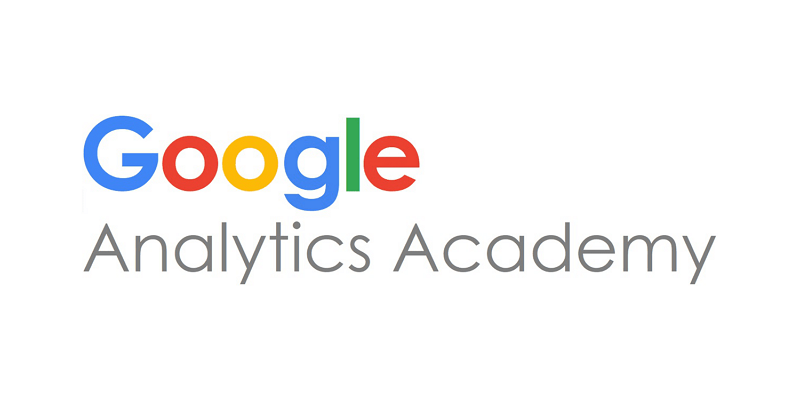 Case Study: Google Analytics Academy
Case Study: Google Analytics Academy- Company: Google
- What Was Done: Google Analytics Academy offers free online courses on a range of topics from Google Analytics fundamentals to advanced features like data collection, processing, configuration, and more. This initiative is designed to help marketers and analysts understand web analytics and gain insights into customer behavior.
- Results/Impact: Through the Academy, numerous marketers and businesses have leveraged Google Analytics more effectively, optimizing their online presence and marketing campaigns. The comprehensive understanding of analytics has enabled marketers to make data-driven decisions, enhancing marketing efficiency and ROI.
Develop a Comprehensive Strategy
- SMART Goals: Set specific, measurable, achievable, relevant, and time-bound goals that align with your business objectives.
- Integrated Marketing Plan: Create a cohesive plan that integrates various channels and tactics, from digital to traditional, ensuring a consistent brand message.
Embrace Content Marketing
- Valuable Content: Produce high-quality, relevant content that educates, entertains, and engages your target audience.
- Content Distribution: Utilize multiple platforms and formats, from blogs and social media to email and video, to distribute your content widely.
 Case Study: HubSpot's Comprehensive Marketing Resources
Case Study: HubSpot's Comprehensive Marketing Resources- Company: HubSpot
- What Was Done: HubSpot has established itself as a leader in inbound marketing by providing a plethora of resources for marketers to excel in their craft. From free online courses in HubSpot Academy to detailed guides and blogs on various marketing topics, HubSpot empowers marketers to perform at a professional level regardless of their experience.
- Results/Impact: HubSpot’s resources have been widely credited for helping businesses of all sizes improve their marketing strategies, leading to increased traffic, leads, and sales. The practical insights and tools offered have helped many marketers refine their skills and strategies, effectively marketing like pros.
Master Digital Marketing Tools
- SEO & SEM: Optimize your online content for search engines to improve visibility and drive organic traffic.
- Social Media: Engage with your audience on social media platforms where they spend their time, using targeted content and ads.
- Email Marketing: Develop personalized email campaigns that nurture leads and keep your brand top-of-mind.
Leverage Data and Analytics
- Data-Driven Decisions: Use analytics to track the performance of your marketing activities, understand what works, and make informed decisions.
- Testing and Optimization: Regularly test different aspects of your marketing, from email subject lines to ad copy, and optimize based on results.
Stay Ahead of Trends
- Continuous Learning: Keep up with the latest marketing trends, technologies, and best practices to stay competitive.
- Innovation: Don't be afraid to experiment with new ideas, platforms, or technologies that could potentially enhance your marketing efforts.
Build Relationships
- Customer Engagement: Foster genuine relationships with your audience through responsive communication and community building.
- Networking: Connect with other marketing professionals, industry influencers, and brands to expand your knowledge and opportunities.
Reflect and Adapt
- Performance Review: Regularly review your marketing strategies and campaigns to assess their effectiveness and identify areas for improvement.
- Flexibility: Be ready to pivot your strategies based on market changes, customer feedback, or unexpected challenges.
Marketing like a pro requires a combination of strategic thinking, creative execution, and an analytical mindset. By staying customer-focused, embracing continuous improvement, and leveraging the power of digital tools and data, you can effectively drive your brand forward and achieve your marketing goals.

Marketing for Dummies
"Marketing For Dummies" by Jeanette Maw McMurtry is a book that serves as an accessible guide to the fundamentals of marketing, designed for those new to the field or anyone looking to brush up on basic marketing principles. Part of the widely recognized "For Dummies" series, which is known for breaking down complex subjects into easy-to-understand formats, this book covers a broad range of topics to provide readers with a solid foundation in marketing.
Key Features
- Comprehensive Coverage: The book offers an overview of essential marketing concepts, including market research, branding, consumer behavior, digital marketing, and the marketing mix (Product, Price, Place, Promotion).
- Practical Advice: It provides practical tips and strategies for implementing effective marketing campaigns, utilizing social media, improving online visibility, and measuring marketing success.
- Up-to-Date Trends: While rooted in timeless marketing principles, the book also addresses contemporary trends, such as digital marketing, content marketing, and the use of analytics.
- Accessible Format: Written in an easy-to-follow, conversational style, it is designed to make the subject matter approachable for beginners without overwhelming them with jargon.
Topics Covered
- Understanding Your Audience: Insights into identifying and segmenting your target market to tailor marketing efforts effectively.
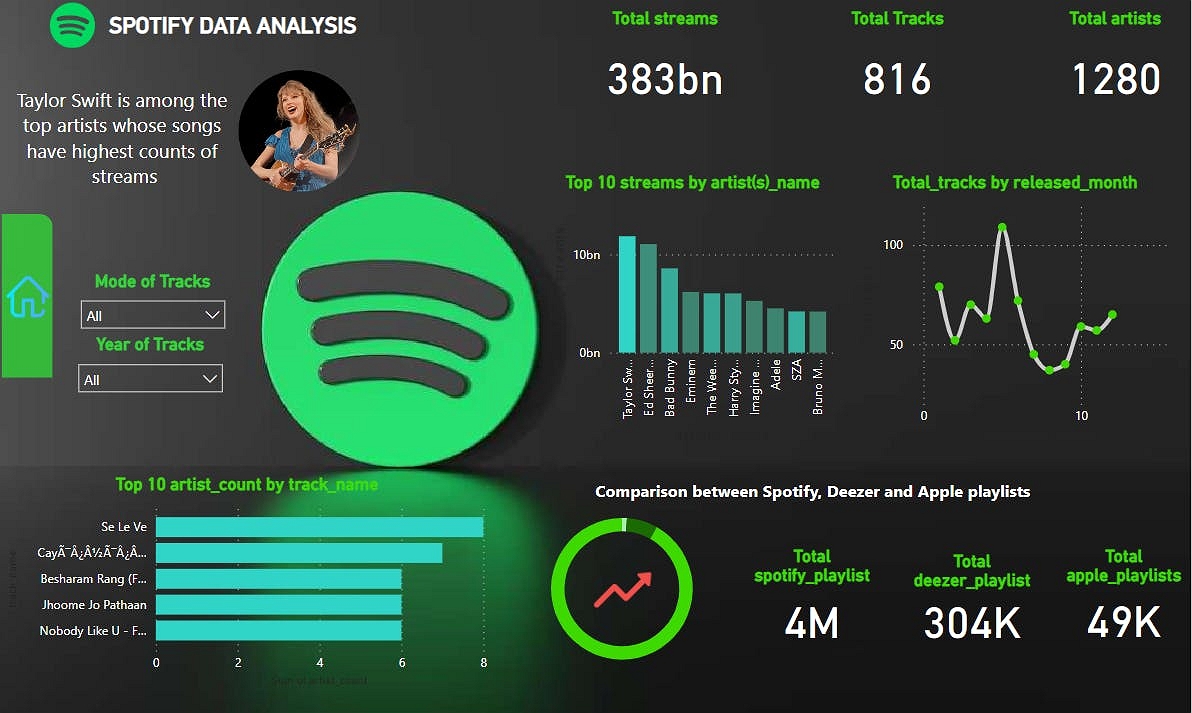 Case Study: Spotify's Use of Data to Enhance User Experience
Case Study: Spotify's Use of Data to Enhance User Experience- Company: Spotify
- What Was Done: Spotify has mastered understanding its audience through the use of sophisticated data analytics, allowing the platform to create highly personalized music and podcast recommendations for its users. This strategy is based on analyzing listening habits, genre preferences, and user interactions.
- Results/Impact: Spotify's personalized playlists, such as "Discover Weekly" and "Daily Mix," have significantly improved user engagement and satisfaction, contributing to its growth as a leading streaming service. This approach demonstrates the importance of deeply understanding your audience to tailor offerings that meet their specific needs and preferences, a key principle discussed in "Marketing For Dummies."
- Building a Brand: Strategies for developing a strong brand identity and positioning your business in the competitive landscape.
 Case Study:
Case Study:
Warby Parker's Customer-Centric Brand Development- Company: Warby Parker
- What Was Done: Warby Parker has built a strong brand identity around customer-centric values, affordability, and social responsibility. By offering a home try-on program and engaging consumers directly through social media, Warby Parker has differentiated itself in the competitive eyewear market.
- Results/Impact: The company's approach to building a brand that resonates with consumers on a personal level has not only fostered customer loyalty but also positioned Warby Parker as an innovator in the retail space. Their success illustrates the power of developing a compelling brand identity that aligns with consumer values and needs, echoing the strategies for building a brand discussed in "Marketing For Dummies."
- Engaging Through Digital Channels: Guidance on leveraging digital marketing channels, including SEO, social media, and email marketing, to engage with customers.
 Case Study: Bella & Bloom Boutique Leverages Instagram for Growth
Case Study: Bella & Bloom Boutique Leverages Instagram for Growth- Company: Bella & Bloom Boutique, United States
- What Was Done: Bella & Bloom, a small online women's clothing boutique, utilized Instagram to engage with its target audience effectively. By creating visually appealing content, leveraging Instagram stories for behind-the-scenes looks, and using targeted hashtags, the boutique was able to showcase its unique fashion offerings and build a community around its brand.
- Results/Impact: Through consistent and engaging social media marketing efforts, Bella & Bloom significantly increased its online visibility, driving both traffic and sales through its website. The boutique's success on Instagram underscores the importance of digital channels in connecting with consumers and growing a small business, highlighting practical advice for digital engagement found in "Marketing For Dummies."
- Crafting Effective Campaigns: Tips for designing and executing marketing campaigns that resonate with your audience and achieve desired outcomes.
- Measuring Success: Techniques for tracking and analyzing the performance of your marketing activities to ensure they deliver ROI.
 Case Study: Craft Beer Coopery Implements a Feedback Loop for Product Improvement
Case Study: Craft Beer Coopery Implements a Feedback Loop for Product Improvement- Company: Craft Beer Coopery, Australia
- What Was Done: Craft Beer Coopery, a subscription service for craft beer enthusiasts, established a customer feedback loop to measure the success of its offerings and marketing campaigns. By sending follow-up emails to subscribers and engaging with them on social media, the company gathered insights on customer satisfaction and preferences, which informed future beer selections and marketing messages.
- Results/Impact: The feedback loop enabled Craft Beer Coopery to tailor its products and marketing efforts more closely to customer preferences, resulting in increased subscription retention rates and customer loyalty. This approach demonstrates the value of measuring marketing success through direct customer engagement and analytics, a strategy emphasized for businesses of all sizes in "Marketing For Dummies.
Who Should Read It
- Marketing Newbies: Individuals just starting their journey in marketing or small business owners looking to understand marketing basics.
- Students: Marketing students or anyone studying business who wants a supplementary resource to their academic materials.
- Professionals: Those in other fields who find themselves needing to understand marketing concepts as part of their role.
"Marketing For Dummies" is a valuable resource for anyone looking to gain a broad understanding of marketing in today's rapidly changing business environment. It demystifies marketing for beginners and provides a solid foundation upon which to build more advanced marketing knowledge and skills.

Marketing Literature
Marketing literature encompasses a wide range of written materials that provide insights, theories, strategies, and practical advice on various aspects of marketing. This literature includes academic textbooks, case studies, industry reports, journals, and books by thought leaders that collectively contribute to the understanding and advancement of marketing as a discipline. Here’s an overview:
Academic Textbooks
- Offer foundational knowledge and cover broad marketing principles, consumer behavior, market research, digital marketing, and strategic planning.
- Examples include "Principles of Marketing" by Philip Kotler and Gary Armstrong, and "Marketing Management" also by Philip Kotler and Kevin Lane Keller.
Case Studies
- Present real-world marketing challenges faced by companies, providing detailed analysis and outcomes to offer practical insights into effective marketing strategies and decision-making.
Industry Reports
- Produced by research firms and industry organizations, these reports provide data on market trends, consumer behavior, digital marketing statistics, and future outlooks.
- Examples include reports by Forrester, Gartner, and the Content Marketing Institute.
Journals
- Academic and professional marketing journals publish peer-reviewed articles on the latest research, theories, and methodologies in marketing.
- Notable journals include the "Journal of Marketing," "Journal of Consumer Research," and "Advertising Age."
Books by Thought Leaders
- Books written by marketing experts and practitioners offer insights into successful marketing strategies, emerging trends, and innovative approaches to marketing challenges.
- Popular titles include "This is Marketing" by Seth Godin, "Influence: The Psychology of Persuasion" by Robert Cialdini, and "Contagious: How to Build Word of Mouth in the Digital Age" by Jonah Berger.
 Book: Made to Stick: Why Some Ideas Survive and Others Die" by Chip Heath and Dan Heath
Book: Made to Stick: Why Some Ideas Survive and Others Die" by Chip Heath and Dan Heath
- Overview: This book explores what makes ideas memorable and how to make messages stick. It’s a guide to helping marketers make their ideas more effective and enduring.
- Results/Impact: Marketers have used the principles from "Made to Stick" to craft more memorable and effective campaigns, leading to increased awareness and engagement.
Emerging Topics
- Recent literature focuses on digital marketing, social media strategies, content marketing, brand storytelling, data analytics, customer experience, and ethical marketing practices.
- These works reflect the evolving landscape of marketing in response to technological advancements and changing consumer expectations.
Key Themes in Marketing Literature
- Foundational Marketing Principles: Covers the core concepts of marketing, including the marketing mix, segmentation, targeting, positioning, and consumer psychology.
- Digital Marketing: Focuses on online marketing strategies such as SEO, content marketing, social media marketing, email marketing, and digital advertising.
- Brand Strategy: Explores how to build, manage, and evolve brand identity and reputation in competitive markets.
- Consumer Behavior: Analyzes how consumers make purchasing decisions and how marketers can influence these decisions through various strategies.
- Marketing Analytics: Discusses the use of data analytics, metrics, and measurement tools to evaluate marketing campaign performance and ROI.
- Innovative Marketing Strategies: Examines emerging marketing trends, innovative practices, and future directions in the marketing field.
Importance
- Marketing literature is invaluable for professionals looking to deepen their marketing knowledge, stay updated on industry trends, and develop strategic marketing skills.
- It serves as a resource for academic study, professional development, and practical application in various marketing roles.
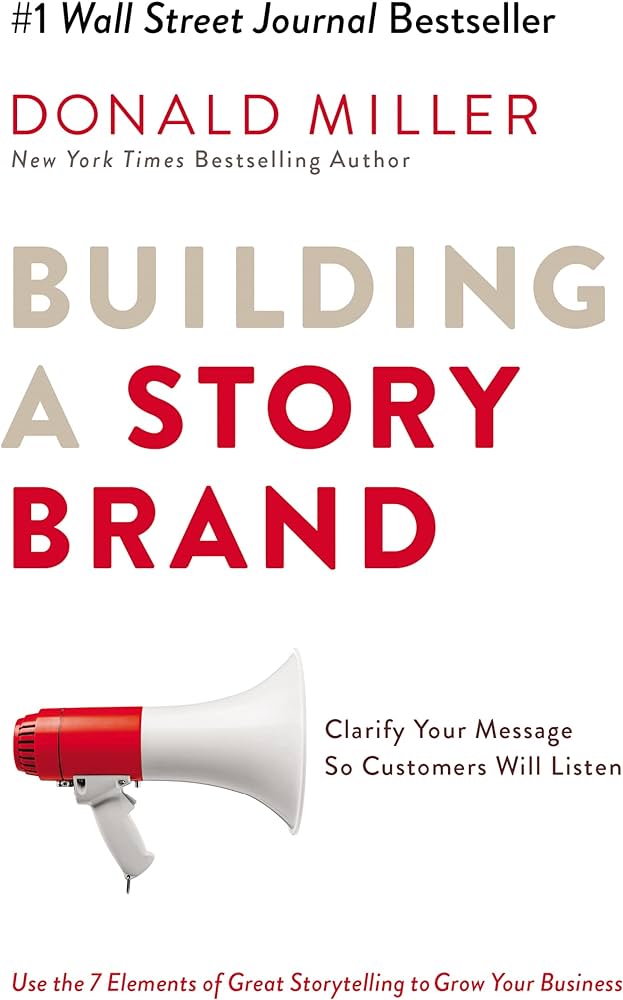 Book: "Building A StoryBrand: Clarify Your Message So Customers Will Listen" by Donald Miller
Book: "Building A StoryBrand: Clarify Your Message So Customers Will Listen" by Donald Miller
- Overview: Donald Miller uses the seven universal elements of powerful stories to teach readers how to dramatically improve how they connect with customers and grow their businesses.
- Results/Impact: The book has become a go-to resource for marketers seeking to improve their branding and messaging, resulting in clearer, more impactful communication with their audience.
Engaging with professional literature is essential for staying abreast of the latest marketing strategies, trends, and innovations. This includes academic textbooks that lay the foundational theories of marketing, case studies that offer real-world insights into successful marketing tactics, industry reports that highlight emerging trends and consumer behaviors, and books authored by thought leaders which provide forward-thinking perspectives and practical advice. By incorporating a diverse range of marketing literature into their ongoing education, marketers can refine their skills, adapt to new challenges, and maintain a competitive edge in their field.

Marketing Books
Marketing books are invaluable resources for professionals looking to deepen their understanding of the field, stay abreast of the latest trends, and refine their strategies. These books range from foundational texts that cover the essential principles of marketing to specialized works focusing on digital trends, consumer psychology, and strategic innovation.
Here’s a curated list of impactful marketing books, each offering unique insights into different aspects of marketing:
Foundational Marketing Principles
- "Principles of Marketing" by Philip Kotler and Gary Armstrong: A comprehensive guide that lays the groundwork for understanding marketing concepts, strategies, and practices.
- "Marketing Management" by Philip Kotler and Kevin Lane Keller: Offers in-depth insights into developing marketing strategies that drive customer value and business growth.
- "Marketing: An Introduction" by Gary Armstrong and Philip Kotler: Provides a clear and comprehensive introduction to the essentials of marketing in today’s digital age.
- "Contemporary Marketing" by Louis E. Boone and David L. Kurtz: Offers insights into modern marketing strategies and practices, emphasizing the importance of social media and digital marketing.
- "The New Strategic Brand Management" by Jean-Noël Kapferer: Explores advanced brand management techniques and the evolving landscape of brand strategy.
Consumer Behavior and Psychology
- "Influence: The Psychology of Persuasion" by Robert B. Cialdini: Explores the psychological principles behind people's decision-making processes, crucial for crafting persuasive marketing messages.
- "Buyology: Truth and Lies About Why We Buy" by Martin Lindstrom: Delves into the findings from a groundbreaking neuromarketing study, revealing subconscious influences on consumer behavior.
- "Predictably Irrational: The Hidden Forces That Shape Our Decisions" by Dan Ariely: Investigates the reasons behind irrational human behaviors and how they impact marketing.
- "Nudge: Improving Decisions About Health, Wealth, and Happiness" by Richard H. Thaler and Cass R. Sunstein: Discusses how marketers can influence consumer choices through subtle changes in the environment.
- "Hooked: How to Build Habit-Forming Products" by Nir Eyal: Provides a framework for creating products that captivate consumers and keep them returning.
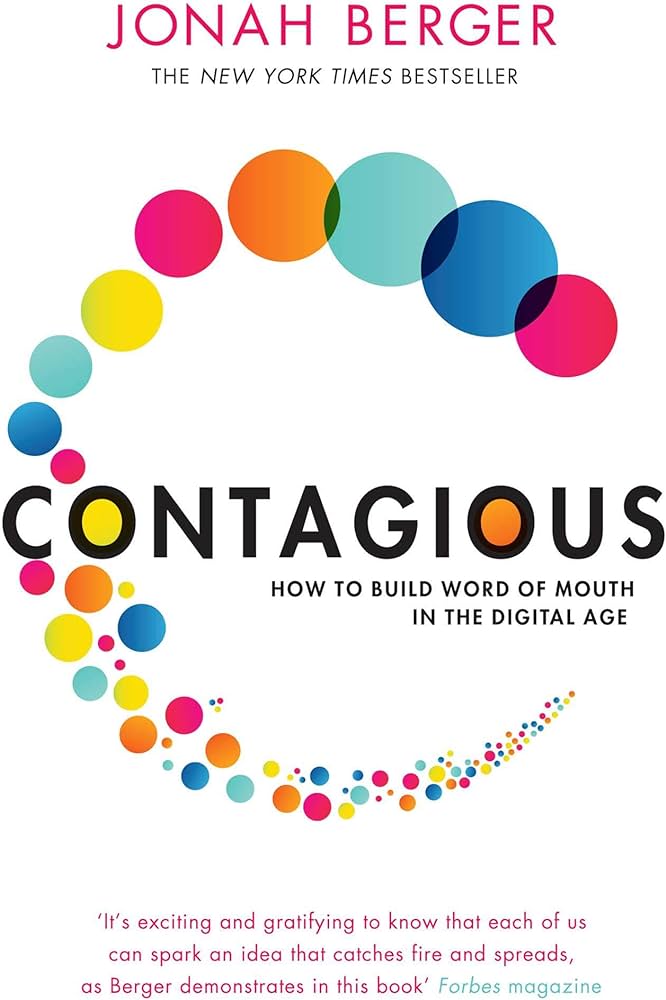 Case Study: Applying Principles from "Contagious" to Boost Viral Marketing
Case Study: Applying Principles from "Contagious" to Boost Viral Marketing
- Book: "Contagious: How to Build Word of Mouth in the Digital Age" by Jonah Berger
- Organization: SpiceCrafters, a startup offering DIY spice blend kits, United Kingdom
- What Was Done: SpiceCrafters applied Jonah Berger’s STEPPS model from "Contagious" to create shareable content and campaigns around DIY cooking experiences, emphasizing the social currency and triggers associated with their products.
- Results/Impact: The application of Berger’s insights led to a viral marketing campaign that doubled SpiceCrafters' social media engagement and significantly increased online sales, validating the effectiveness of Berger's strategies for creating word-of-mouth buzz.
Digital Marketing and Social Media
- "Digital Marketing For Dummies" by Ryan Deiss and Russ Henneberry: A practical guide to digital marketing strategies, including SEO, social media, and email marketing.
- "Jab, Jab, Jab, Right Hook: How to Tell Your Story in a Noisy Social World" by Gary Vaynerchuk: Provides strategies for effectively communicating your brand's story on social media platforms.
- "Epic Content Marketing" by Joe Pulizzi: Details how to develop content that informs, entertains, and compels audiences to act.
- "The Art of SEO: Mastering Search Engine Optimization" by Eric Enge, Stephan Spencer, and Jessie Stricchiola: A comprehensive guide to SEO practices that drive traffic and improve visibility.
- "Social Media Marketing All-in-One For Dummies" by Jan Zimmerman and Deborah Ng: Offers an extensive look into leveraging social media platforms for marketing success.
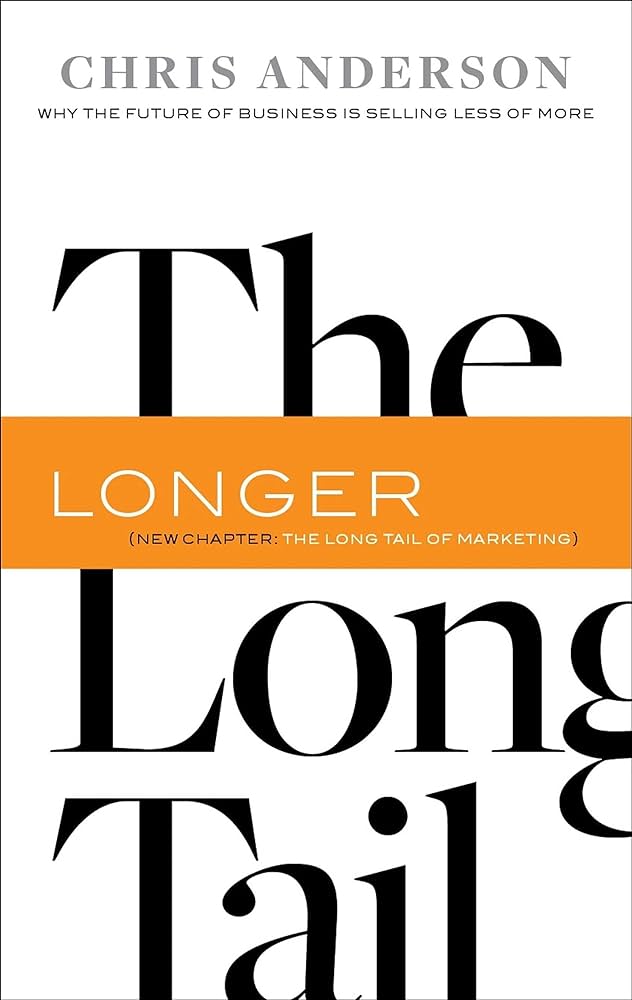 Case Study: "The Long Tail" Influence on Niche Marketing Strategies
Case Study: "The Long Tail" Influence on Niche Marketing Strategies
- Book: "The Long Tail: Why the Future of Business is Selling Less of More" by Chris Anderson
- Organization: Eucalyptus & Bloom, an online boutique specializing in rare and exotic houseplants, United States
- What Was Done: Inspired by Chris Anderson’s "The Long Tail," Eucalyptus & Bloom focused its marketing strategy on catering to niche markets with specific interests in unique houseplants, using targeted online advertising and content marketing to reach its audience.
- Results/Impact: Leveraging long-tail marketing principles led to a 40% increase in sales within a year and a substantial growth in online following. The strategy effectively positioned Eucalyptus & Bloom in a unique market segment, demonstrating the book's concepts in practice.
Branding and Positioning
- "Positioning: The Battle for Your Mind" by Al Ries and Jack Trout: Introduces the concept of positioning and its importance in making a brand distinguishable in the marketplace.
- "Building A StoryBrand: Clarify Your Message So Customers Will Listen" by Donald Miller: Offers a framework for clarifying your brand message to improve customer engagement and conversion.
- "Designing Brand Identity: An Essential Guide for the Whole Branding Team" by Alina Wheeler: Covers the process of brand development and design to create meaningful brand identities.
- "Brand Sense: Sensory Secrets Behind the Stuff We Buy" by Martin Lindstrom: Explores how brands can engage with consumers using all five senses to create a memorable experience.
- "Different: Escaping the Competitive Herd" by Youngme Moon: Offers a fresh perspective on how to differentiate brands in a crowded marketplace.
Strategic Marketing
- "Blue Ocean Strategy" by W. Chan Kim and Renée Mauborgne: Presents a systematic approach to making the competition irrelevant by creating new market spaces, termed "blue oceans."
- "This is Marketing: You Can’t Be Seen Until You Learn to See" by Seth Godin: Challenges traditional marketing tactics and emphasizes the importance of building trust and empathy with your audience.
- "Good Strategy Bad Strategy: The Difference and Why It Matters" by Richard Rumelt: Delves into the elements of high-quality strategy and how to avoid common pitfalls.
- "Crossing the Chasm: Marketing and Selling High-Tech Products to Mainstream Customers" by Geoffrey A. Moore: Discusses strategies for tech products to break into and dominate new markets.
- "Growth Hacker Marketing: A Primer on the Future of PR, Marketing, and Advertising" by Ryan Holiday: Introduces the concept of growth hacking as a cost-effective alternative to traditional marketing.
Content Marketing and Storytelling
- "Content Inc.: How Entrepreneurs Use Content to Build Massive Audiences and Create Radically Successful Businesses" by Joe Pulizzi: Outlines a six-step process for using content to build a loyal audience and achieve entrepreneurial success.
- "The Storyteller's Secret" by Carmine Gallo: Explores how storytelling can captivate, convince, and inspire in both personal and professional contexts.
- "Made to Stick: Why Some Ideas Survive and Others Die" by Chip Heath and Dan Heath: Analyzes why certain ideas are more effective and memorable than others.
- "Everybody Writes: Your Go-To Guide to Creating Ridiculously Good Content" by Ann Handley: Provides insights and tips on producing outstanding content across various platforms.
- "Killing Marketing: How Innovative Businesses Are Turning Marketing Cost Into Profit" by Joe Pulizzi and Robert Rose: Rethinks traditional marketing models to turn marketing into a direct source of revenue.
These books provide a mix of theoretical foundations, practical advice, and innovative strategies, catering to marketing professionals at all levels of expertise. Whether you’re new to marketing or a seasoned professional, reading widely from the wealth of marketing literature available can enhance your knowledge, inspire new ideas, and significantly impact your marketing efforts.

Marketing Trade Magazines
Marketing trade magazines serve as a vital resource for professionals seeking to stay updated on the latest trends, strategies, and news within the marketing industry. These publications offer insights into emerging technologies, case studies, interviews with leading marketers, and analyses of successful marketing campaigns.
Here’s an overview of notable marketing trade magazines that are influential within the industry, divided into groups according to their primary focus:
Advertising and Media Strategy
- AdWeek: Comprehensive coverage of media strategy, brand marketing, and digital platforms.
- Campaign: Focuses on creative campaigns, advertising news, and media strategy.
- The Drum: Global insights into advertising, design, and digital marketing.
- Advertising Age (AdAge): Industry-standard for advertising news, trends, and data analysis.
 Case Study: "AdAge" Insights Drive Boutique Agency's Strategy
Case Study: "AdAge" Insights Drive Boutique Agency's Strategy- Publication: Advertising Age (AdAge)
- Organization: CreativeSolutions, a boutique digital marketing agency, Canada
- What Was Done: CreativeSolutions regularly utilized insights and trends from AdAge to inform its marketing strategies and client recommendations, especially focusing on digital advertising innovations and consumer behavior trends highlighted in the magazine.
- Results/Impact: Staying informed on industry trends through AdAge enabled CreativeSolutions to adapt quickly to market changes, leading to a 25% increase in client acquisition and a 35% improvement in campaign performance for existing clients over two years.
Digital Marketing and Technology
- Marketing Land: Covers a wide range of digital marketing topics including analytics and email marketing.
- ClickZ: Analysis and insight on digital marketing trends and technologies.
- MarTech Today: Dedicated to marketing technology news and strategies.
- Search Engine Journal: Specializes in SEO and search engine marketing.
- Social Media Examiner: Expertise in social media marketing strategies and trends.
- eMarketer: Data and analysis on digital marketing and media.
Content Marketing and Social Media
- Content Marketing Institute (CMI): Leading resource on content marketing strategies and best practices.
- Digiday: Insights into digital innovations impacting marketing and media.
Business-to-Business (B2B) Marketing
- B2B Marketing: Specializes in content for the B2B marketing community.
- Chief Marketer: Provides content targeting marketing executives, with a focus on B2B.
Marketing Education and Professional Development
- Marketing Profs: Offers educational resources across various marketing disciplines.
- Marketing Week: In-depth articles on marketing trends and consumer insights.
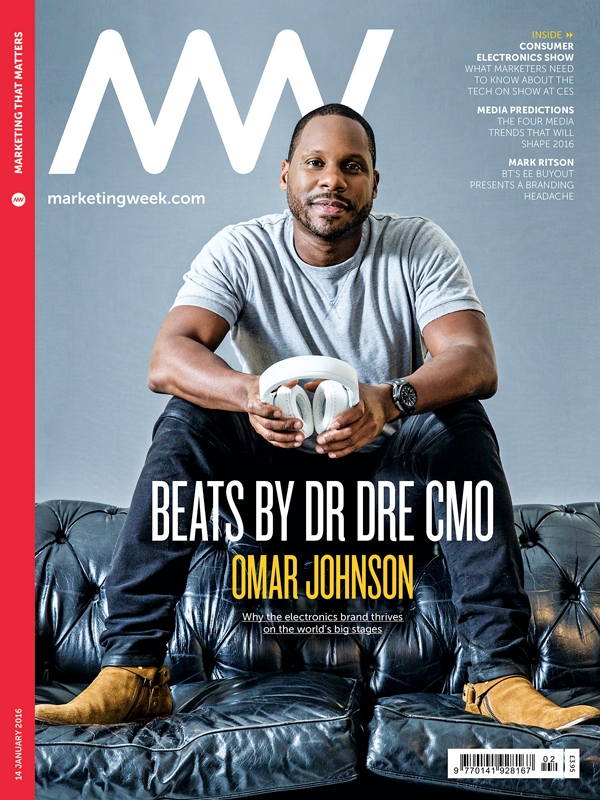 Case Study: "Marketing Week" Fuels Local Restaurant Chain's Growth
Case Study: "Marketing Week" Fuels Local Restaurant Chain's Growth- Publication: Marketing Week
- Organization: armFresh Eateries, a local restaurant chain focusing on farm-to-table dining experiences, Australia
- What Was Done: FarmFresh Eateries leveraged case studies and marketing best practices from Marketing Week to enhance its local marketing efforts, focusing on community engagement and sustainable eating.
- Results/Impact: Insights from Marketing Week helped FarmFresh Eateries to refine its marketing approach, resulting in a 50% increase in dine-in and takeout orders and a stronger brand presence in the local community.
Public Relations and Integrated Marketing
- PR Week: Valuable for integrated marketing communications, with a primary focus on public relations.
Direct and Data-Driven Marketing
- Direct Marketing News (DMN): Focuses on direct marketing strategies and customer relationship management.
- MediaPost: Provides insights into media, marketing, and advertising with an emphasis on data-driven decisions.
These trade magazines are essential for marketing professionals who aim to keep their skills sharp, understand the evolving landscape of marketing, and apply innovative strategies in their work. They not only offer valuable information on current and future trends but also serve as a platform for sharing knowledge and best practices within the marketing community. Whether in print or online, marketing trade magazines are an indispensable tool for anyone looking to excel in the field of marketing.

Marketing Training
Marketing training encompasses a comprehensive range of educational programs, workshops, and courses designed to equip professionals with the skills, knowledge, and competencies required to excel in the diverse field of marketing. From foundational principles to advanced digital strategies, marketing training programs cater to various levels of expertise and areas of specialization.
Here's an overview of what marketing training entails and its significance:
Key Components of Marketing Training
- Foundational Marketing Principles: Courses that cover basic marketing concepts, such as the 4 Ps (Product, Price, Place, Promotion), market segmentation, targeting, and positioning.
- Digital Marketing: Training in SEO (Search Engine Optimization), SEM (Search Engine Marketing), content marketing, social media strategies, and email marketing.
 Case Study:
Case Study:
Small Business Growth through Google's Digital Garage- Company: The Honey Pot, a local artisanal honey shop, United Kingdom
- What Was Done: The owner of The Honey Pot utilized Google's Digital Garage for free digital marketing training, focusing on SEO, online advertising, and social media engagement to increase the shop's online presence.
- Results/Impact: Implementing the digital marketing strategies learned from Google's Digital Garage resulted in a 75% increase in online sales and a significant boost in local foot traffic, demonstrating the value of accessible marketing training for small business growth.
- Data Analytics and Measurement: Programs focused on the use of analytics tools, interpreting data, and measuring the effectiveness of marketing campaigns.
- Consumer Behavior: Understanding how and why consumers make purchasing decisions, incorporating insights from psychology and sociology.
- Brand Management: Strategies for building and maintaining a strong brand identity and reputation.
- Strategic Marketing Planning: Developing long-term marketing strategies aligned with business objectives.
- Emerging Trends: Keeping abreast of the latest trends, such as influencer marketing, marketing automation, and experiential marketing.
Formats of Marketing Training
- Online Courses: Platforms like Coursera, Udemy, and LinkedIn Learning offer a wide range of marketing courses catering to different skill levels and specializations.
- Workshops and Seminars: Interactive sessions, frontal or online (e.g. - via webinars), led by industry experts, often organized by professional associations or educational institutions.
- Certification Programs: Structured programs offered by recognized institutions or industry bodies, such as the Digital Marketing Institute (DMI) or the American Marketing Association (AMA), that provide certifications upon completion.
- In-House Training: Customized training programs developed by organizations for their marketing teams to enhance specific skills or knowledge relevant to their business.
 Case Study:
Case Study:
General Electric's Digital Marketing Transformation
- Company: General Electric (GE), Global
- What Was Done: GE invested heavily in digital marketing training for its employees, aiming to transform its marketing approach and embrace digital innovation. This included workshops, online courses, and collaboration with digital agencies.
- Results/Impact: GE's comprehensive marketing training program led to a revitalized marketing strategy that leveraged social media, content marketing, and data analytics, improving customer engagement and driving business growth.
Benefits of Marketing Training
- Skill Enhancement: Keeps marketing professionals up-to-date with the latest tools, techniques, and best practices.
- Career Advancement: Provides the credentials and competencies needed for career progression or to pivot into specialized areas of marketing.
- Strategic Insight: Enhances strategic thinking and the ability to develop effective, data-driven marketing strategies.
- Networking Opportunities: Attending training programs and workshops can facilitate networking with peers and industry experts.
Continuous Learning
- The field of marketing is constantly evolving, driven by changes in technology, consumer behavior, and media consumption. As such, continuous learning through marketing training is essential for professionals aiming to remain competitive and effective in their roles. Whether you're a newcomer to the field or a seasoned marketer, investing in training is crucial for personal development and career success in marketing.
In summary, marketing training offers a pathway for professionals to acquire new skills, refine existing ones, and stay ahead in the fast-paced marketing industry. It provides a foundation for understanding consumer needs, leveraging digital channels effectively, and driving business growth through strategic marketing efforts.
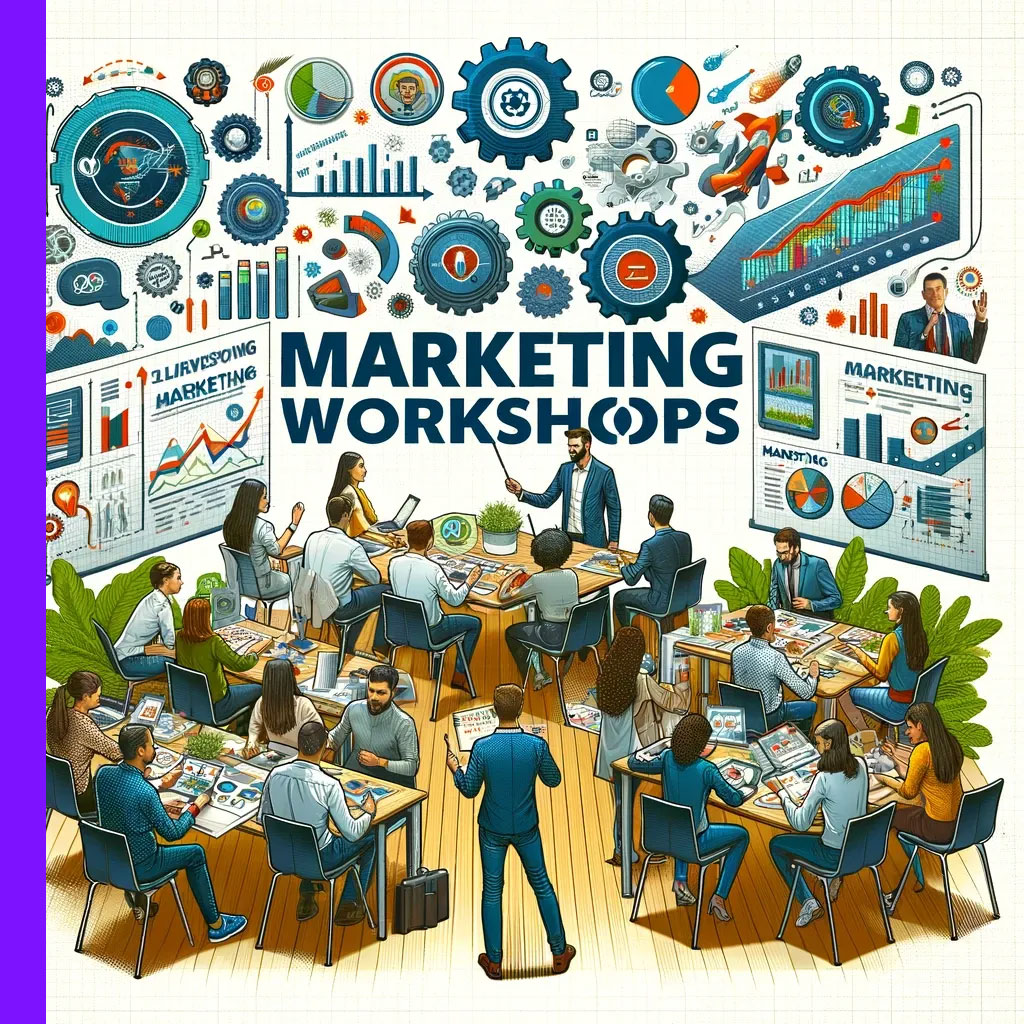
Marketing Workshops
Marketing workshops are interactive sessions designed to equip participants with practical skills, innovative strategies, and the latest insights in the field of marketing. Unlike traditional lecture-based training, workshops emphasize hands-on learning, group activities, and real-world applications, making them highly effective for professionals looking to enhance their marketing expertise.
Here’s an overview of what marketing workshops typically offer:
Key Features of Marketing Workshops
- Interactive Format: Workshops are characterized by their participatory nature, encouraging attendees to engage in discussions, group exercises, and problem-solving activities.
- Focused Topics: They often concentrate on specific areas of marketing, such as digital marketing tactics, content creation, brand storytelling, SEO strategies, or social media engagement.
- Expert Facilitators: Led by experienced marketers and industry experts, workshops provide valuable insights from professionals with real-world experience.
- Networking Opportunities: Participants have the chance to connect with other marketing professionals, fostering a community of learning and potential collaborations.
Benefits of Attending Marketing Workshops
- Skill Enhancement: Workshops provide practical skills and knowledge that can be immediately applied to marketing projects and campaigns.
- Up-to-Date Trends: They offer insights into the latest marketing trends and technologies, helping professionals stay ahead in a rapidly evolving field.
- Problem-Solving: Interactive sessions allow participants to tackle marketing challenges, fostering creative and strategic thinking.
- Customized Learning: Many workshops are tailored to meet the specific needs and interests of their audience, making the learning experience more relevant and impactful.
Common Topics Covered
- Digital Marketing: Strategies for leveraging digital channels effectively, including social media, email marketing, and online advertising.
- Content Marketing: Techniques for creating and distributing valuable content to attract and engage target audiences.
 Case Study: HubSpot’s Inbound Marketing Workshop Impact on a Start-Up
Case Study: HubSpot’s Inbound Marketing Workshop Impact on a Start-Up- Company: FreshFarm, a start-up specializing in subscription-based delivery of fresh produce, Boston, USA
- What Was Done: FreshFarm participated in a HubSpot Inbound Marketing Workshop, which provided in-depth training on content creation, SEO, social media marketing, and lead nurturing tailored to their business model.
- Results/Impact: Post-workshop, FreshFarm implemented an inbound marketing strategy that led to a 40% increase in subscriber base within six months. The workshop's practical insights into inbound marketing directly contributed to this growth, emphasizing the effectiveness of targeted marketing education in driving business results.
- Branding and Positioning: Insights into developing a strong brand identity and positioning it successfully in the market.
- Customer Engagement: Strategies for building and maintaining strong customer relationships through personalized communication and engagement tactics.
- Analytics and Measurement: Training on how to use data analytics tools to measure the success of marketing campaigns and make data-driven decisions.
Finding Marketing Workshops
- Professional Associations: Organizations like the American Marketing Association (AMA) and Digital Marketing Institute (DMI) frequently host workshops.
- Conferences and Summits: Marketing conferences often include workshops as part of their programming, providing learning opportunities alongside keynote speeches and panel discussions.
- Local Meetups and Networking Groups: Many cities have marketing-focused meetup groups that organize workshops and training sessions.
- Online Platforms: Websites like Eventbrite or Meetup can be excellent resources for finding virtual and in-person marketing workshops.
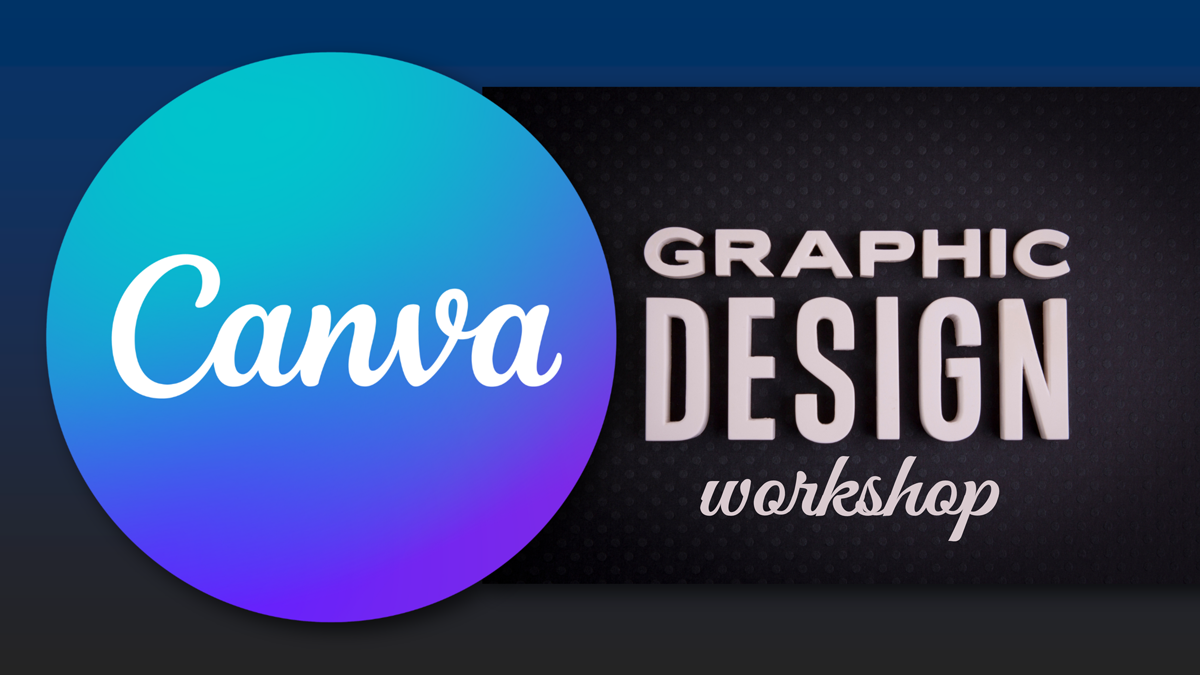 Case Study: Canva Design Workshop Enhances Non-Profit’s Campaigns
Case Study: Canva Design Workshop Enhances Non-Profit’s Campaigns
- Organization: GreenEarth, a non-profit focused on environmental awareness, San Francisco, USA
- What Was Done: GreenEarth attended a Canva Design Workshop aimed at empowering non-profits to create impactful visual content. The workshop covered topics from basic design principles to creating effective social media graphics.
- Results/Impact: Leveraging skills acquired at the workshop, GreenEarth significantly improved the visual appeal of their online campaigns, resulting in a 50% increase in social media engagement and a 20% uptick in donations. This underscores the value of skill-focused workshops in enhancing marketing outcomes for organizations.
Marketing workshops are an invaluable resource for professionals seeking to refine their marketing skills, learn new strategies, and stay competitive in the field. By offering a blend of theoretical knowledge, practical application, and peer interaction, workshops provide a dynamic and effective learning environment tailored to the needs of marketing practitioners.

Marketing Events
Marketing events play a crucial role in the professional development of marketers, offering platforms for learning, networking, and exploring the latest trends and innovations in the field. These events range from international conferences and digital webinars to local workshops and networking meetups, each designed to cater to various aspects of marketing, from digital strategies and content creation to consumer insights and brand management.
 Case Study: Small Business Growth via Attendance at Social Media Marketing World
Case Study: Small Business Growth via Attendance at Social Media Marketing World
- Company: BrewBright, a small craft brewery, Denver, USA
- What Was Done: BrewBright attended the Social Media Marketing World event, gaining insights into the latest social media strategies and networking with marketing professionals. They learned about content trends, audience engagement techniques, and influencer partnerships specific to their industry.
- Results/Impact: Implementing new social media strategies learned at the event, BrewBright saw a 60% increase in their social media followers and a 30% increase in taproom visits over the next quarter. The event provided actionable strategies that directly contributed to their marketing success.
Here’s a broader look at the types of marketing events and their benefits
Types of Marketing Events
- Conferences: Large gatherings that feature keynote speeches, panel discussions, and breakout sessions on a wide range of marketing topics. They attract a diverse audience from around the globe.
- Seminars and Workshops: Focused sessions that offer in-depth training on specific marketing tools, techniques, or concepts. They are ideal for acquiring new skills or deepening existing knowledge.
- Webinars: Online seminars that provide the convenience of remote participation, making it easier for a global audience to access expert insights and case studies.
- Trade Shows and Expos: Events that showcase the latest products, services, and technologies in the marketing field, providing a unique opportunity for hands-on learning and networking.
- Networking Events: Informal gatherings designed to foster connections among marketing professionals, encouraging the exchange of ideas and the formation of partnerships.
Benefits of Attending Marketing Events
- Knowledge Enhancement: Stay updated on the latest marketing trends, strategies, and tools through sessions led by industry experts and thought leaders.
- Networking Opportunities: Connect with peers, mentors, and potential clients or partners. Networking can lead to collaborations, job opportunities, and the exchange of valuable insights.
- Skill Development: Many events offer workshops or certification programs that help marketers enhance their skill sets in areas like digital marketing, analytics, or content strategy.
- Innovation Exposure: Discover innovative marketing technologies and platforms that can improve efficiency and effectiveness in your marketing efforts.
- Brand Visibility: For businesses, participating in or sponsoring marketing events can significantly enhance brand visibility and establish thought leadership within the industry.
 Case Study: Tech Startup's Launch Success at CES
Case Study: Tech Startup's Launch Success at CES
- Company: SmartHomeSolutions, a tech startup specializing in home automation products, Las Vegas, USA
- What Was Done: SmartHomeSolutions launched its flagship product at the Consumer Electronics Show (CES), leveraging the event's platform for product demonstrations, media coverage, and B2B networking opportunities.
- Results/Impact: The exposure at CES led to significant media coverage, multiple distribution deals, and a substantial pre-order list, marking a successful product launch. Participating in this high-profile industry event played a crucial role in the startup's market entry strategy, demonstrating the impact of carefully selected marketing events on achieving business milestones.
Finding Marketing Events
- Industry Publications and Websites: Resources like AdWeek, Marketing Week, and the Content Marketing Institute often list upcoming marketing events.
- Professional Associations: Organizations such as the American Marketing Association (AMA) and the Digital Marketing Institute (DMI) host and promote marketing events.
- Social Media and Online Forums: LinkedIn, Twitter, and specialized marketing forums are excellent sources for discovering marketing events and obtaining attendee feedback.
- Event Platforms: Websites like Eventbrite and Meetup feature calendars of marketing events ranging from local meetups to international conferences.
Participation in marketing events is invaluable for professionals aiming to navigate the complex landscape of modern marketing. Whether the goal is to stay ahead of industry trends, develop new skills, or expand professional networks, marketing events offer a wealth of opportunities for growth and development.

Marketing Events Near Me
To find marketing events near you, consider using a combination of online resources, networking groups, and industry publications. Here are some strategies to discover upcoming marketing events, workshops, conferences, and networking opportunities in your area:
Online Event Platforms
- Eventbrite: Search for marketing events using location filters to find local workshops, seminars, and networking meetups.
- Meetup: Focuses on bringing together people with common interests. Search for marketing and digital marketing groups in your region that regularly host events.
- LinkedIn Events: Utilizes your professional network to discover events that your connections are attending or that are sponsored by companies in your industry.
 Case Study: Local SEO Seminar Boosts Regional Marketing Firm’s Client Outcomes
Case Study: Local SEO Seminar Boosts Regional Marketing Firm’s Client Outcomes
- Company: LocalBoost, a regional marketing firm specializing in SEO services for small businesses, Philadelphia, USA
- What Was Done: LocalBoost attended a local SEO seminar designed to update businesses on the latest trends in search engine optimization, with a focus on local search strategies and Google’s algorithm updates.
- Results/Impact: Applying the advanced SEO techniques learned at the seminar, LocalBoost was able to enhance its services, leading to a 35% average increase in search rankings for their clients within six months. This improvement significantly boosted the visibility of their clients' businesses in local search results, demonstrating the value of attending geographically relevant marketing events for professional development and service enhancement.
Professional Associations
- American Marketing Association (AMA): Check the local chapters of professional marketing associations like the AMA for events, workshops, and networking opportunities.
- Local Chamber of Commerce: Often hosts networking events, business expos, and workshops that can be valuable for marketing professionals
Industry Publications and Websites
- Marketing Week, AdAge, and AdWeek: These and other marketing publications frequently list industry events, including regional conferences and seminars.
- Industry Blogs and Newsletters: Subscribe to marketing blogs and newsletters for announcements and recommendations of upcoming events.
Social Media and Forums
- LinkedIn and Facebook Groups and Pages: Search for marketing groups or pages specific to your region. Event announcements and discussions about upcoming marketing activities are common.
- Twitter and Instagram: Follow local marketing agencies, organizations, and influencers who often post about events or meetups.
Universities and Colleges
- Academic Institutions: Check nearby universities and colleges for guest lectures, panels, and conferences open to the public. These institutions often host marketing events that provide both learning opportunities and networking.
Tips for Finding Events
- Set Google Alerts: Create alerts for marketing events in your city to receive notifications about relevant news and event announcements.
- Network: Engage with your local marketing community online and in person. Networking can often lead to personal invitations to events or insider information about upcoming opportunities.
- Check Regularly: Many platforms update their event listings frequently, so it’s a good practice to check these resources regularly.
 Case Study: Craft Brewery Expands Market Reach Through Local Marketing Meetup
Case Study: Craft Brewery Expands Market Reach Through Local Marketing Meetup
- Company: RiverBend Brewing, a craft brewery looking to expand its market presence, Orlando, USA
- What Was Done: RiverBend Brewing participated in a local marketing meetup, engaging with other businesses and marketing professionals to exchange ideas on community engagement, event marketing, and partnerships.
- Results/Impact: Leveraging insights and contacts gained from the meetup, RiverBend successfully executed a series of community events and partnerships with local restaurants, leading to a 25% increase in sales and broader brand recognition within the local market. This growth underscores the benefits of engaging in local marketing events for strategic networking and collaborative marketing efforts.
By leveraging these resources and staying engaged with your local marketing community, you can discover a variety of marketing events that match your interests and professional development goals. Attending these events can provide valuable learning experiences, enhance your network, and expose you to new trends and strategies in the marketing field.
Marketing Strategy and Consulting
Interested in getting help with your marketing efforts and marketing strategy?
Contact us: info@zooz.co.il ,+972-9-958-5085
Marketing Articles
- Marketing Overview
- Marketing Goals
- Marketing Metrics
- Marketing Types
- Marketing Channels
- Demographic Marketing
- Marketing Business Models
- Industry-Specific Marketing
- Professional Services Marketing
- Marketing Strategy
- Market Research
- Marketing Communications (MarCom)
- Marketing Execution
- Makreting Careers
- Marketing Education
- Marketing Glossary (200 terms)
- Marketing Versus Other Disciplines
- Marketing Agencies and Outsourcing





